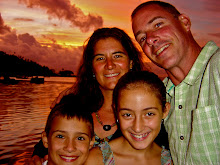This week marks Fiji Day, when Fijians celebrate their independence from Great Britain. We spent the week studying Fiji history so that Tica and Ian have a brief understanding of what we will be celebrating when we go into town on Saturday. The following is a summary of their notes on the subject. -- Brooke
Fiji: A Brief History
>> People came to the islands from Polynesia in 2120 B.C.E. and settled along the coast for fishing. They called their land and themselves “Viti.
>> In 500 B.C.E., natives started moving inland and engaging in farming in addition to fishing.
A growing population led to more and more intertribal conflict, with no one chief or tribe in charge. Cannibalism became a ritual for humiliating defeated foes.
>> Europeans passed through Fiji in the 1640s when Abel Tasman sailed through and charted part of the archipelago but treacherous reefs and Viti’s reputation as “The Cannibal Isles” kept mariners away for the next 130 years.
>> Captain Cook arrived 1774 and changed the name from “Viti” to “Fiji”, probably what he heard when he asked the natives the name of the islands.
>> After the mutiny of his ship the Bounty in 1789, Captain William Bligh and 18 crewmen sailed the waters between Viti Levu and Vanua Levu, now called “Bligh Water”. (Our home at Siga Siga Sands looks out on these waters.) Bligh’s boat was 21 feet long and they sailed more than 3,600 nautical miles from Tonga to Timor.
>> Europeans traders eventually started trade routes from Fiji for sandalwood (1804-1813), bêche de mer or sea cucumber (1830-1850), cotton (1860s, especially during the American Civil War years), sugar cane, copra and pine.
>> In the 1830s, missionaries (mostly Methodists) came from Tahiti to convert Fijians to Christianity with some success. Fijians melded the religion with their worship of ancient ancestral gods.
>> On October 10th, 1874, Fiji became a colony when Chief Cakobau and 12 other chiefs ceded Fiji to Queen Victoria. They thought that Britain could help them to consolidate their rule over all of Fiji. The colonial capital was established in Levuka on the island of Ovalau.
>> The colonial government did two things to try to make the Fijians happy. These two things would have a major effect on Fiji’s future up until the present.
>> First, the colonial government forbade the sale of Fijian land to foreigners. Even today, 83 percent of land is still owned by Fijians.
>> Second, the British also forbade the use of Fijian natives as laborers on copra, cotton and sugar cane plantations. Instead, the colonial government brought in Indians or “Girmitiyas”, indentured servants from India to do the work. Most were Hindu but some were Muslims and Christians. They came to Fiji on five year contracts and, once the contacts were fulfilled, they stayed. Many brought their families over to join them.
>> Indenture ended in 1919, by which time there were 60,000 Indians in Fiji.
>> Relations between Indo-Fijians and native Fijians were restricted. Indo-Fijians could not buy land so they went into small businesses and leased land from Fijians for farming.
>> In 1882, Suva, on Viti Levu, became the new colonial capital.
>> On October 10th, 1970, Fiji gained its independence from Britain. They adopted a British Parliamentary model of government with two houses. A “House of Lords” was comprised of Fijian chiefs.
>> The problem remains of relations between Indo-Fijians and Fijians. Today, 51 percent of Fiji’s population is made up of ethnic Fijians; 44 percent is made up of Indo-Fijians. The Fijian government has struggled over how to fairly take into the account the interests of the competing groups. They have had so much trouble that there have been three coups d’etat since independence – in 1987, 2000 and 2006. The government that took over in 2006, that of Frank Bainimarama is still in power and to date has not held democratic elections. On September 1st, 2009, a little more than two weeks before we arrived, Fiji was kicked out of the British Commonwealth because they have not held democratic elections.
>> Fiji remains an independent country however, and on Saturday, we will celebrate its 39th birthday.
(Sources include the Moon Handbook on Fiji by David Stanley and the Lonely Planet Guide to Fiji by Dean Starnes and Nana Luckham. We also planned to visit the Savusavu town library this afternoon in order to do some more research. The trip was put off due to the tsunami warning spurred by the earthquake off Vanuatu. We’ll try and get the tomorrow but wanted to get this posted.)

No comments:
Post a Comment